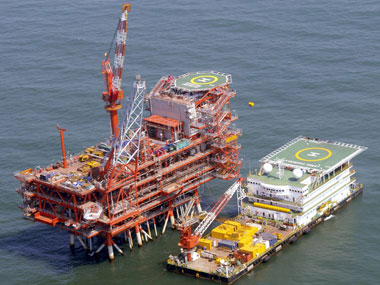New Delhi: Europe’s second biggest oil firm BP head Bob Dudley and his partner Reliance Industries chairman Mukesh Ambani today sought clarity on pricing of natural gas as they felt an interim arrangement being considered by the government was inadequate.
Mr Dudley, on a stop-over visit on way to Shanghai, along with Ambani drove to Planning Commission deputy chairman Montek Singh Ahluwalia’s residence for a breakfast meeting this morning and had sought a meeting with Law Minister Ashwani Kumar.
[caption id=“attachment_699606” align=“alignleft” width=“380”] BP-RIL want the government to spell out a clear roadmap for migrating to market determined gas pricing. Reuters[/caption]
The duo are believed to have sought clarity on pricing of natural gas from April next year when the current sub-market price of $4.2 per million British thermal unit expires.
“They are very concerned, they are very keen that government that a view (soon). That process is underway. I wasn’t able to tell him what we are going to decide,” Mr Ahluwalia told reporters here.
BP-RIL want the government to spell out a clear roadmap for migrating to market determined gas pricing in the next 3-5 years so as to provide clarity to producers to make investment decisions.
“I did say that there is an EGoM (Empowered Group of Ministers) and it will be considering Rangarajan Committee (recommendation),” Mr Ahluwalia added.
Mr Ahluwalia and Mr Kumar are members of the ministerial panel on gas pricing and allocation (EGoM) headed by Defence Minister A K Antony.
Impact Shorts
More ShortsMr Dudley, on his second visit in as many months, and Mr Ambani feel the Rangarajan Committee recommendation of doubling domestic natural gas price to $8-8.5 per mmBtu will be inadequate for bringing high risk deepsea discoveries to production.
A panel headed by C Rangarajan, chairman, Economic Advisory Council to the Prime Minister, observed that the current price for domestic gas was out of sync with global rates and suggested an interim “hybrid producer price” derived by averaging international hub prices with cost of imported liquid gas (LNG) for next five years.
The price as per this formula comes to $8-8.5 per mmBtu as opposed to $4.2 per mmBtu that BP-RIL get for gas from their eastern offshore KG-D6 fields.
“The price determined through the Committee’s recommended formula is at a 40-50 per cent discount to the existing free market price of imported LNG into India,” BP India head Sashi Mukundan had last month written to Pulok Chatterji, principal secretary to the Prime Minister.
At the proposed price, he said, “new production will come only from existing producing fields” but “technically challenged resources and projects in deep water and high risk exploration will be uneconomical to develop and produce.”
“Most of the discovered deep water/high pressure-high temperature resources (about 10 Trillion cubic feet including 4-5 Tcf with RIL-BP) will not be economically feasible to develop at the resultant price and their lack of development will only exacerbate India’s natural gas deficit,” he added.
Mr Ahluwalia said Dudley-Ambani also briefed him about their “assessment of production they could get from D6”.
Output from KG-D6 block has this month fallen to an all-time low of 16.5 million standard cubic meters per day and BP-RIL see an upside of at least 30 mmscmd if satellite and smaller fields surrounding the currently producing main fields are quickly brought into production.
Also, Mr Ambani briefed “me about development of (RIL’s) 4G (telecom venture)… what are the prospects looking ahead,” Mr Ahluwalia said.
Mukundan had on March 8 written that the pricing formula suggested in the interim to gas-on-gas competition (free market scenario) was not the “arms-length market determined” price as provided in the Production Sharing Contract (PSC) like the one signed for KG-D6.
PSC provides for discovering a market price through open tender and does not provide government dictating a rate.
“It was on the basis of this PSC that BP made its large investment (of $7.2 billion) in the India,” he wrote.
In case the Rangarajan Committee suggested pricing is chosen as starting point for market determined pricing, the government should detail “a clear roadmap to transition in the next three-five years to a market determined price (LNG or alternate liquid fuels parity).”
“Such a roadmap will provide the clarity and certainty necessary to enable long-term investments by the producer, importers, and the consumers of gas,” he said, adding the landed price of imported liquefied natural gas (LNG) at $13-14 was representative of the “arms-length market price” for gas.
PTI


)

)
)
)
)
)
)
)
)



